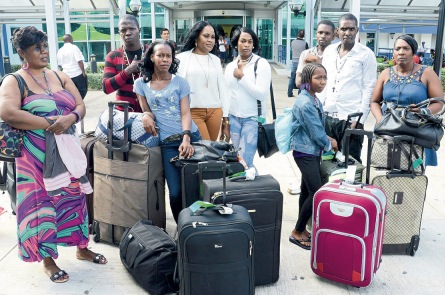“The reality of free movement in the Caribbean”
December 5th, 2013 Countries in the Caribbean Community have agreement on paper that allows free movement of people across borders, but as Khadija Holder, 24, a Commonwealth Correspondent from Trinidad and Tobogo writes, there are still hurdles to overcome.
Countries in the Caribbean Community have agreement on paper that allows free movement of people across borders, but as Khadija Holder, 24, a Commonwealth Correspondent from Trinidad and Tobogo writes, there are still hurdles to overcome.
Integration within CARICOM has come under heavy criticism in the past decade.
Early concerns of insular nationalism and recent issues of implementation and development deficits have made regional integration within the CARICOM sphere far from desired, to say the least.
However, two incidents stand out as particularly deleterious and counterproductive to the integration process: the recent denationalization of Haitian descendants in the Dominican Republic, and denial of entry to Trinidad and Tobago for 13 Jamaican citizens.
Article 45 of the 2001 Revised Treaty of Chaguaramas establishing the Caribbean Community (CARICOM) including the CARICOM Single Market and Economy reads, “Member States commit themselves to the goal of the free movement of their nationals within the Community”. Unlike Trinidad and Tobago, Jamaica and Haiti, the Dominican Republic has yet to become a member of CARICOM. However, the country has applied for membership to CARICOM and under terms of the partnerships that the Dominican Republic is pursuing with its Caribbean neighbours and the European Union, intra-regional integration within CARIFORUM is ‘important’.
However, intra-regional integration was evidently not the focus when the Dominican Republic Constitutional Court, on September 23rd 2013, issued a decision effectively denationalizing Haitian immigrants born after 1929, who do not have at least one parent of Dominican blood. This ruling not only rendered 250,000 persons stateless, it ruled that many Haitian descendants, despite being Dominican-born, must return to Haiti – a country to which they possess no national identification, have not previously entered, and are unable to communicate in (having never learnt to speak Haitian Creole).
Approximately two months later the dream of any real CARICOM integration once again dwindled amongst ‘Westindians’. On Tuesday November 19th 2013, thirteen Jamaicans were denied entry into Trinidad and Tobago, detained and sent back to Jamaica on the first flight Wednesday morning. According to reports they made to media agencies, their CARICOM passports were confiscated by the Trinidadian immigration officials, they were ordered to sit on a wooden bench throughout the night, and allegedly told to sign a refusal of entry form or spend the night in jail.
Although free movement of natural persons is a difficult pillar to implement in any regional agreement due to the simultaneous importance of national security, it must be realized that these occurrences present a paradox against human rights and human development – tenets that guide the New Development Paradigm as outlined by UN Secretary General Ban Ki Moon within his New York Address on 17 May 2012.
We must recollect the Shanique Myrie case, where the defendant (Ms. Myrie) claimed discrimination against her nationality as the reason she was subjected to a body-cavity search in unsanitary and demeaning conditions when she arrived in Barbados on March 14, 2011. Ms. Myrie was detained and deported the next day to Jamaica.
Our Caribbean countries that have been integrated via agreements, Memorandum of Understandings, and Declarations must endeavour towards achieving actionable integration that emphasizes the importance of human rights and development.
Photo: http://www.jamaicaobserver.com/news/Stay-out_15488318
…………………………………………………………………
About me:
Discovering my great passion and ambition to advocate for global progress through research-writing stands as one of my most fulfilling attainments to date. I am currently a Research Fellow at the Caribbean Centre for Research on Trade and Development (CCRTD), a Research Consultant for JDR Research Solutions Barbados, a Researcher at Athens Development and am becoming internationally certified in Spanish and French. In my spare time I engage in volunteerism through organizations such as Junior Achievement.
…………………………………………………………………………………………………………………
Opinions expressed in this article are those of the author and do not necessarily represent the views of the Commonwealth Youth Programme. Articles are published in a spirit of dialogue, respect and understanding. If you disagree, why not submit a response.
To learn more about becoming a Commonwealth Correspondent please visit: http://www.yourcommonwealth.org/submit-articles/commonwealthcorrespondents/
…………………………………………………………………………………………………………………




